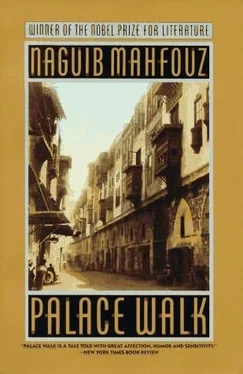Alice Thomas Ellis, "Guardian"
'A masterpiece of character-drawing… Like all great writers, Mahfouz combines humour with irony and pathos, and undermines time-honoured judgements with subtlety and wit'
Nessim Dawood, "The Times"
'With "Palace Walk"… Mahfouz established himself as the Arab world’s leading realist, importing the methods he had learned from Flaubert and the Russians and applying them to the lives of the Cairene middle classes'
"Sunday Times"
'Nobel prizewinner Naguib Mahfouz’s wonderfully readable family saga "Palace Walk" provides a riveting and accurate portrait of Egyptian society at the beginning of the 20th century'
"Bookseller"
'There is nothing in world literature quite like "Palace Walk". In it Mahfouz created characters who are larger than life and yet perfectly credible, and he has explored their inner life with marvellous psychological penetration… This is writing worthy of a Tolstoy, a Flaubert or a Proust'
Philip Stewart, "Independent"
'…faced with the superbly translated first volume of his Cairo Trilogy… we find ourselves in the presence of a master… Mahfouz offers a romantic but naughtily detached insight into the toils of Egyptian domesticity'
"Mail on Sunday"
'The alleys, the houses, the palaces and mosques and the people who live among them are evoked as vividly in [Mahfouz's] work as the streets of London were conjured up by Dickens'
"Newsweek"
'A magnificent work'
"Chicago Sun-Times"
'"Palace Walk" is a feast indeed'
"Chicago Tribune"
'Rich in psychological insight and cultural observation… A majestic and capacious accomplishment'
"Boston Globe"
'The simple truth is that "Palace Walk" is a wonderful story'
"Seattle Times"
'A tale told with great affection, humor and sensitivity, in a style… that in this translation, is always accessible and elegant'
"New York Times" Book Review
Shiraz — Persian
fez — a brimless cone-shaped flat-crowned hat that usually has a tassel, is usually made of red felt
caftan — a usually cotton or silk ankle-length garment with long sleeves that is common throughout the Levant
ennui — a feeling of weariness and dissatisfaction
ablutions — the washing of one’s body or part of it (as in a religious rite)
chanteuse — a woman who is a concert or nightclub singer
shaykh — a religion guide
kohl — a preparation used especially in Arabia and Egypt to darken the edges of the eyelids
qanun — a zitherlike musical instrument
ululation — howl or wail
bey — a provincial governor
mihrab — a niche or chamber in a mosque indicating the direction of Mecca
Kunya name:
… an honorific name. "Umm" means mother…. Amina’s Kunya name would be Umm Fahmy; Yasin is older, but he is not her son.
A kunya (Arabic) is a name which is honorably given to the mother or father of an Arabic child. Kunya is pronounced koon-ya. A married person (especially ladies) are called by their kunya name, which is abu (father) or umm (mother) plus the name of their first son. Their whole name is their name plus their kunya. For example, Umm Ja'far Aminah is the mother of Ja'far. The kunya precedes the personal name.
A kunya (Arabic) or Kunyat is an honorific widely used in place of given names through the Arab world and the medieval Muslim world. It is a component of an Arabic name, a type of epithet referring to the bearer’s first-born son or daughter.
Abu (father) or umm (mother) precedes the son’s name, in a genitive (idafa) construction. The English equivalent would be to call someone whose eldest son is named John "Father of John". Use of the kunya normally signifies some closeness between the speaker and the person so addressed, but is more polite than use of the first name. The kunya is also frequently used with reference to politicians and other celebrities to indicate respect.












